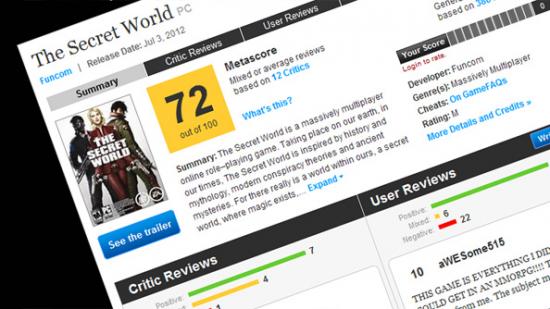What is Metacritic for? Is it the go-to method of taking a game’s temperature? Is it a rough and dirty register of the mass market? Or is it the great evil of the game industry, as some have claimed, crushing the natural diversity of opinions into a homogenised mush and, worse, needlessly nixing bonuses for developers who don’t manage to attain the arbitrary targets it sets?
At the Develop conference in Brighton today a panel was dedicated to discussing just that. Made up of development and journalism luminaries, there was broad agreement that they only used Metacritic to check out film scores, or as a quick fix, rather than a serious opinion. As Paul Wedgewood, CEO of Splash Damage put it, “I do look at it occasionally, but usually just for the fun factor.”
He went on to say “I suppose it’s the role of the critic that’s more important in all of this. Journalists help in discovering content, especially with indie games. A review…it adds meaning in the way a score can’t. But the review score is the critical thing – do people care about them anymore?”
A good point, and as Andy Payne of Mastertronic put it, “It annoys me when people scroll down to the score, and don’t read the words. I always want my review to be in the words.”
Freelance journalist Simon Parkin took this further. “The problems with scores is that people seem to think they give an impression that there’s maths behind the numbers. But really scores are signifiers. It’s not an empirical value. Signifiers are important, but when we start treating them like there’s math or science behind it, that’s when we’re in trouble. Like when EA pull all their games that get 70 or less.”
That certainly is a dangerous attitude for games publishers to have, which can explain the backlash journalists and publications sometimes get after unfavourable review scores go out. “There are times where we’ll be in trouble because we mark lower than other people,” said Keith Stewart, Games Contributor for The Guardian, “and we get devs on the phone complaining because we’ve dragged down their Metacritic score.”
Jon Jordan of Pocket Gamer added, “We’ve got a thing now, where if a game doesn’t get 5 stars, it’s a failure.”
But is this a fair pressure to put on games journalists, when their job is to give the reader an informed assessment of a game?
Network N’s own James Binns weighed in, explaining what journalists are there for. “There are three things a reviewer is trying to do. Firstly, answer the question ‘should you play this game?’ Secondly, to entertain you. Which means a reviewer will have more sport with bad games than good. The third bit is they’re trying to access whether the game is good as art – in the terms of ‘is it entertaining?’
Returning to Paul, he re-instated that really, people want opinions, not a cold hard number. “In life your opinions are what people are more likely to pay attention to. Jeremy Clarkson vs. Rover, Hugh Featherly Whittingstall vs. Tesco, Charlie Brooker vs. humans. You remember what they say.” He paused. “Fans can be much much worse though – no critics have ever said anything about my glasses. Apart from Simon. In private.”
So, words are more important than the final score – that’s the overwhelming consensus from the Brighton panel, although it’s clear that Metacritic is a necessary and now fundamental aspect of the games industry. It’s not going anywhere – and nor should it – but we just need to learn to look beyond the number.
